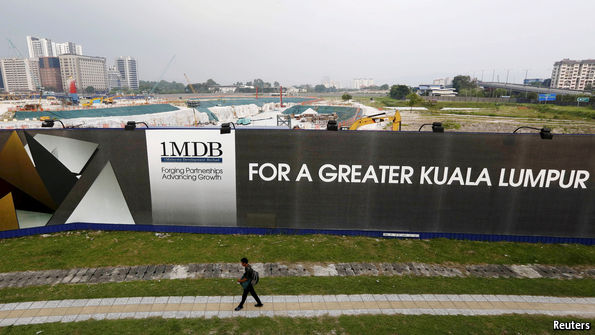ON MAY 24th authorities in Singapore said they were shutting down the local arm of BSI, a private bank, for violations of its licence. The company, which is also facing criminal proceedings in its native Switzerland, is one of several banks to have handled cash linked to 1MDB, a Malaysian state investment firm which is at the heart of a widening financial scandal. Investigations into money flows related to 1MDB are under way in half a dozen countries, and appear to be accelerating. What is the affair all about?
The 1Malaysia Development firm (1MDB) was created in 2009, shortly after Najib Razak, Malaysia’s prime minister, took office. The idea was to attract investment into Malaysia by forging joint ventures with foreign firms. Yet by 2014 it was struggling to service debts of over $11 billion. Its affairs are complex, but two deals in particular have raised eyebrows. The first is a partnership with a small Saudi oil company, into which 1MDB injected around $1 billion in 2009, some of which, investigators think, is now unaccounted for. Another focus is a deal from 2012 in which IPIC, an Abu Dhabi state fund, agreed to act as a guarantor for 1MDB: funds due under that arrangement are said to have been paid not to IPIC’s subsidiary but to an unrelated firm in the British Virgin Islands. Investigators in Switzerland say that around $4 billion may have been misappropriated from Malaysian state firms. All those involved deny wrongdoing.
The scandal widened in July 2015, when the Wall Street Journal reported that around $700m had entered bank accounts belonging to Mr Najib shortly before a general election in 2013, which his coalition narrowly won. Mr Najib firmly denies claims that the cash came from 1MDB. His camp says the money was a legal personal donation from a Saudi royal, who approved of how his government was running Malaysia, and that much of it was returned. The country’s attorney-general agrees, and says there is no reason for the prime minister to face charges.
Investigations into the affair could shed light on the effectiveness and implementation of rules which are supposed to reduce the risk of cross-border money-laundering. Investigators in America are said to be looking into whether any money from 1MDB was used to buy luxury properties, and whether any of it went to a Hollywood production company run by Mr Najib’s stepson (which says it has done nothing wrong). Several other banks involved in 1MDB's dealings may yet face censure. Meanwhile protesters in Malaysia have called for the prime minister to resign. But Mr Najib has hung on to his job. He wields enormous influence within UMNO, the party which has led Malaysia’s ruling coalitions since independence and which enjoys broad support from the country’s ethnic-Malay majority. Many voters seem to accept the government’s insistence that the whole affair has been cooked up by the opposition—whom, it hints, favours the interests of Malaysia's ethnic-Chinese and Indian minorities over those of ethnic Malays.


No comments:
Post a Comment